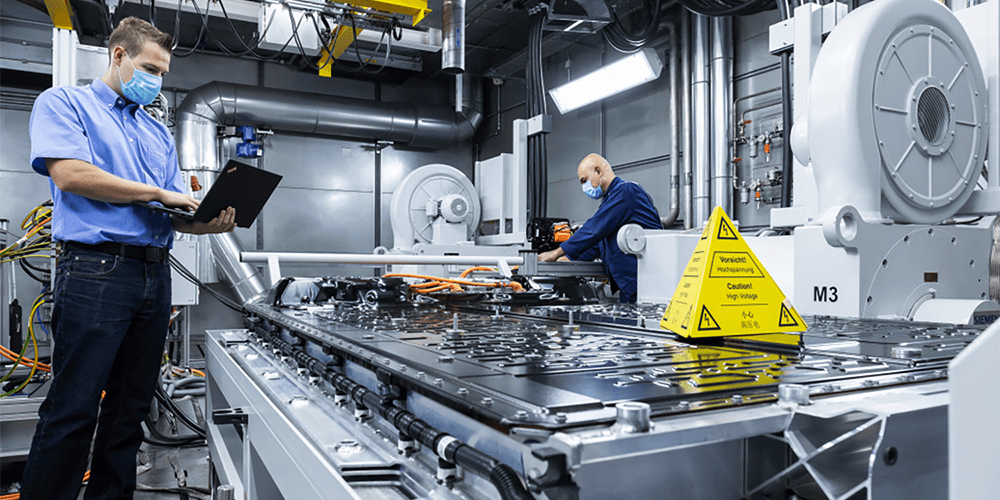Daimler to produce lithium-ion cells near Stuttgart
A dispute over the electric campus at Mercedes seems to have been settled and Daimler has now announced that it will build the ‘Mercedes-Benz Drive Systems Campus’ in Stuttgart-Untertürkheim. The main plant is to be focussed on electric vehicles, which included the production of lithium-ion cells.
According to Daimler, electric drive and battery technology will be developed in the technology competence centre. The group said that this underpins the strategy announced in October 2020 and that it will invest a three-digit million amount in the project.
After “intensive negotiations”, the management and the works council (union) at the Mercedes-Benz plant in Untertürkheim agreed to build the campus. The agreement was preceded by a long conflict between management and employee representatives: when the management wanted to outsource crankshaft production to the Polish plant in Jawor last year (to make room for the campus), the works council objected. As a result, Markus Schäfer, the board member responsible for development, threatened to build the electric campus at another Mercedes location.
Research, development and production start-ups of drive systems are now to be concentrated in Untertürkheim, which is also the largest site of Daimler’s powertrain production network. “The agreement strengthens Untertürkheim’s role as a development and qualification hub for powertrain technologies,” Daimler said.
The E-Technikum and Zell-Technikum already established in Untertürkheim are to be integrated into the campus, as is the battery research and development scope located in Esslingen-Nabern, including various test benches. The cell technical centre is to be expanded “in order to be able to map the entire value chain of battery technology” – from basic research, pre-development and the design of battery cells to small-scale production in order to test “series-ready producibility”.
This also gives the site the battery cell production that has been demanded by the works council for a long time, although production will only amount to a small series. This is to go into operation by 2023. In addition, a separate ‘Battery Safety Lab’ is to be built on the campus, which will expand the existing battery development capacities.
For series production, the site is to focus on electric drive systems rather than batteries. An agreement in principle to produce parts of the electric powertrain (eATS) at the Untertürkheim site was already reached in December 2019. However, the focus on battery and electric drive systems also means that “conventional engine, transmission and component production will gradually be phased out, which will have an impact on employment profiles and scopes”, according to Daimler. This is because the company wants to use the “flexibility of the global powertrain production network” for new conventional powertrains. “New production scopes will be examined in detail with regard to maximising efficiency and profitability,” Daimler said.
The group also says that the next generation of electric motors will be developed “in-house” at the campus and “equipped with inverters and high-voltage technology”. The production and assembly of parts of the eATS from 2024 is to “round off” the product portfolio at the site. Untertürkheim to assemble batteries, not manufacture cells
Nevertheless, production in Untertürkheim will also be about batteries with the assembly of battery systems from purchased cells. Batteries for plug-in hybrids are to be assembled in the Brühl plant section (which is located in Esslingen but is still counted as part of the Untertrürkheim plant by Daimler) from 2022. Assembly of battery systems for the EQS, which is being built 20 kilometres away at the Sindelfingen vehicle plant, will already start this year at the Hedelfingen plant. Later, the batteries for the EQE will also be assembled in Hedelfingen.
“Taking a leading role in electric vehicles means further boosting our own research and development and achieving maximum progress with global tech partners,” says Chief Development Officer Schäfer now of the agreement. “I am totally convinced that in development and production, optimal access to new technologies and global expertise as well as redirecting the use of capital to carbon-neutral investments will be more crucial than ever in the future. This requires maximum flexibility and the consistent scrutiny of existing structures.” A clear focus, he said, is on “research and process engineering of battery and cell technology, taking into account the entire value chain”.
Jörg Burzer, Member of the Board of Management for Production, adds: “With the Mercedes-Benz Drive Systems Campus we make sure that the drive systems of tomorrow can be designed to a very significant extent at the site. Moreover, producing high-tech battery systems and electric drive systems, drive components ‘made in Untertürkheim’ will continue to define Mercedes-Benz vehicles in the future.”
Independently of the campus in Untertürkheim, the wholly-owned Mercedes subsidiary AMG had also announced the groundbreaking ceremony for a new e-testing centre at its headquarters in Affalterbach on the same day.
With reporting by Sebastian Schaal, Germany





0 Comments